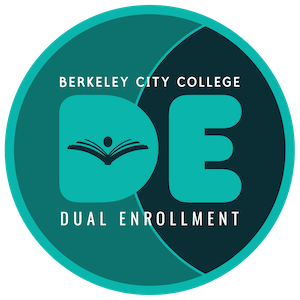
Dual Enrollment
Berkeley City College
Glossary of Terms And Phrases You Should Know
Assessment – How we determine the level of math or English you are prepared to take. Assessment can also include multiple measures beyond the placement tests. For example, we can also review your high school transcripts to help determine which courses you are ready to take.
Associate in Arts (AA)/Associate in Science (AS) – BCC’s graduation degrees usually require at least two years of full-time study and completion of 60-semester units, including major and GE courses. The requirements to complete the A.A. and A.S. degrees can be found in the college catalog’s program and course description section and on BCC’s website.
Associate Degree for Transfer (AD-T) – Obtaining an AD-T guarantees the student priority admission to a CSU in a similar upper-division program. Students who obtain this degree have a junior standing when transferring to a CSU.
Asynchronous – Asynchronous courses typically have no required meeting times online or in person. Scholars are expected to follow asynchronous courses weekly in Canvas and complete all assignments and activities within the assigned deadlines.
Career Education (CE) – An educational program specializing in skilled trades, applied sciences, modern technologies, and career preparation. At BCC, we offer a variety of certificates and degrees related to CE in high-demand industries such as Business Administration, Education Teacher Preparation, Human Services, Computer Science, Multimedia Arts, and Biotechnology.
Certificate of Achievement – Some programs include the opportunity to earn credentials – these are a great way to update your skills or break into a new career. Like a degree, a Certificate of Achievement is noted on your official transcript. They are a minimum of 16 units and often connect to an Associate degree.
Certificate of Proficiency: Certificate of Proficiency (CP): Some programs include the opportunity to earn credentials – these are a great way to update your skills or break into a new career. They are smaller unit certificates and are often part of a pathway.
College and Career Access Pathways (CCAP) law (also known as AB288) – This law formalizes dual enrollment partnerships between colleges and K-12 institutions, emphasizing serving all students fairly.
Community college – A college that offers lower-division college credits, and awards associate degrees and career-related certificates.
Co-requisite – A course required to be taken during the same term with another.
Course Catalog – Published annually, the catalog includes a wealth of information about courses, campus resources, student services, program descriptions, degree requirements and college policies. You can review the catalog online.
Dual-Credit – Collaborative efforts between high schools and BCC through which high school students are permitted to enroll in college courses and are awarded college and high school credit for the same course.
Dual Enrollment – An opportunity that allows current high school students to take college courses with the permission of a designated school administrator and parent/guardian.
Dual Enrollment Student – A student simultaneously enrolled in high school and college.
Double Counting – A course that will fulfill two requirements: GE and major prerequisites.
Freshman – You are considered a freshman until you have completed 30 transferrable units.
Full-Time Status – You are enrolled in at least 12 units in a given term.
General Education (GE) or “Breadth” Requirements – A series of required courses in the primary academic areas, regardless of major, required of all students enrolled in college who are working toward a degree.
Grade-Point Average (GPA) – The grade-point average measures your performance in letter-graded courses.
Lower Division – The first and second years of study in a college program, which generally includes GE and major prerequisites.
Major – Courses required in the student’s main area of academic/career program interest area.
Part-time status – A student who is enrolled in 11 or fewer units.
Pathway – A comprehensive program that includes a specific course sequence, that leads to a certificate of achievement or associate’s degree.
Placement Testing – The process of gathering information about the individual student, reflecting the student’s academic strengths and areas for improvement. Placement testing is offered at no charge at BCC.
Prerequisite – Previous background or course completions required for entry into another course. Prerequisites are listed in both the college catalog and class listing.
Proficiency – The ability to comprehend a subject at a specific level in such courses as a foreign language, math, or English.
Probation – A period of time during which a student who has done unsatisfactory work must improve academic achievement. A student may be on probation for either progress or academic reasons. Lack of improvement may lead to dismissal. See the college catalog for a specific policy.
Registration – Official process of enrolling in courses. Registration can be done online through the Peralta student account or in the Admissions Office.
Schedule of Classes – A list showing the range of subjects offered in a term. You can also see the days and times in the week at which particular subjects are taught; and locations where the classes are scheduled to meet.
Section Number – A number assigned to differentiate the same courses offered during a term.
Sophomore – You are considered a sophomore after you completed 45 transferable units.
Synchronous – Synchronous courses have a required virtual meeting time. For example, if your course says Monday from 2:00 – 3:00 PM, expect to meet virtually for that course during that designated time. Most BCC/Peralta professors use Zoom for synchronous online course meetings. The instructor will likely post the Zoom link for your course in Canvas and/or email it to your Peralta Student Email.
Transcript – A student’s academic record.
Transfer Pathway – The alignment of courses with transfer institutions that allows the student to earn optimal credit for university majors.
Unit – Sometimes used synonymously with “credit” in referring to the value earned in a course.
Upper Division – The junior and senior years of study in a college program. Community colleges do not offer upper-division courses.
Withdrawal or “W” – Dropping a course. The student must drop classes by the appropriate deadline to avoid non-passing marks on their transcripts. Upon withdrawing from a course, scholars will be assigned a “W.” Withdrawal grades do not affect your overall GPA.

 Canvas
Canvas
 Donate
Donate
 Let's Talk!
Let's Talk!